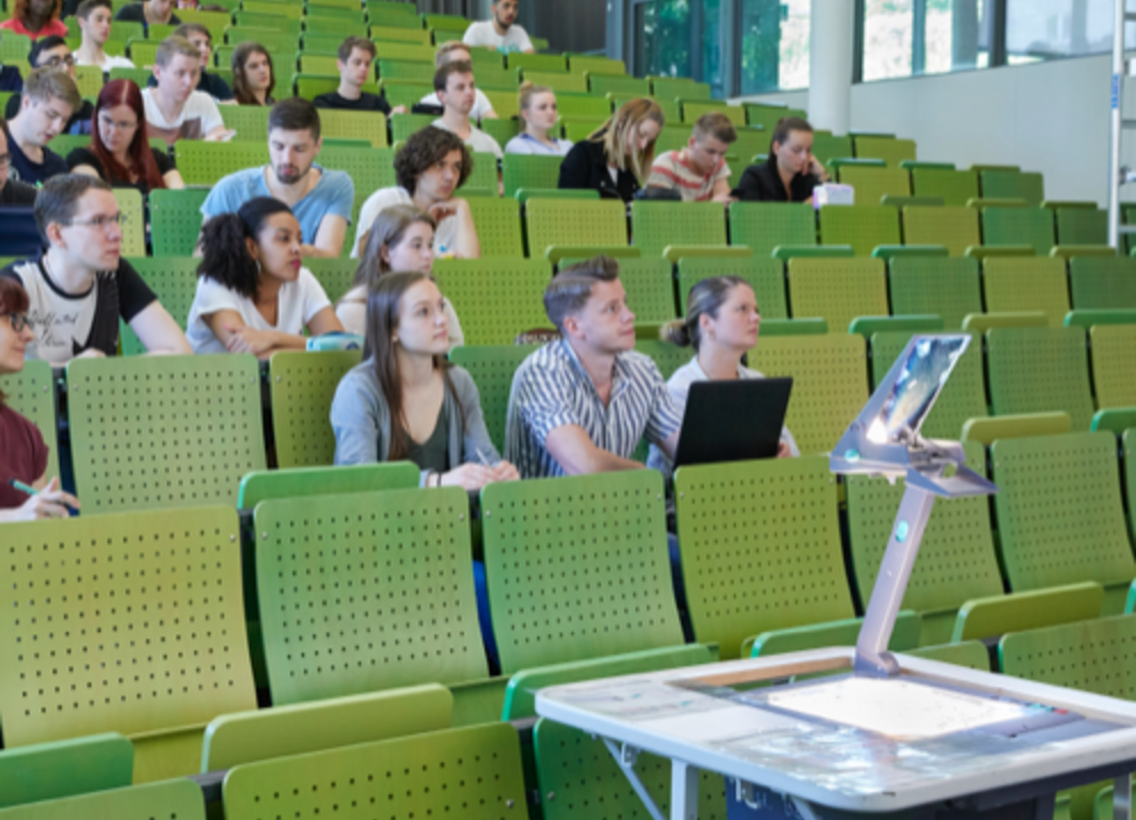On this page, you will find information about courses, student research projects, and final theses offered by the Research Group "Educational Technology".
Comprehensive information regarding modules and courses is available in StudiLöwe and in the module handbooks for your degree programme, which can be accesses under the Studies section of the IfB website.
Current courses
G-BIL-WP9-a
- Design and conception of media and media content (Diekmann)
Module handbook G-BIL-WP9
G-BIL-WP9-a
- Digitally supported collaboration (Schledjewski)
Module handbook G-BIL-WP9
G-BIL-WP9-a
- Learning support with Digital Media (Schrader)
Module handbook G-BIL-WP9
G-BIL-WP9-b
- Digital educational games for elementary school teaching:
Fundamentals and practical development of game-based formats (Schrader)
(Prerequisite for enrolment in this seminar is the successful completion of the module component G-BIL-WP9-a)
Module handbook G-BIL-WP9
K-BIL 3b
- Virtual Spaces for use in educational science contexts (Diekmann)
Module handbook K-BIL3 (PO 2021)
Module handbook K-BIL3b (PO 2014)
K-BIL 3c
- Digital Ethics and Game-Based Learning (Schrader/Schwartz)
Module handbook K-BIL3 (PO 2021)
Module handbook K-BIL3c (PO 2014)
Learning modules in the Digital Competences module (B. A.)
- Introduction of Digital Media & Good Practice in the educational contexts (Schrader)
- Theoretical foundations of learning with media (Schrader)
- Instructional design of digital tools: introduction into multimedia design principles of design (Schrader)
- Models for planning Instruction with Digital Media (Schrader)
- Feedback and support in digital teaching-learning media (Schrader)
Student research projects
As part of student research projects (FoPro), it is also possible to participate in ongoing projects in the department.
The aim of the research project is to impart basic competencies for the implementation of educational science questions in empirical research work. The focus is on learning in immersive Virtual Reality environments.
During the course of the seminar, participants develop their own research question on learning processes in Virtual Reality and go through all the steps of a quantitative research process together. Possible questions relate to emotional, motivational or cognitive processes as well as to the acquisition of knowledge when learning with Virtual Reality.
Central theoretical approaches, methodological principles and current empirical findings are taught to enable students to work on their research questions in a well-founded manner. In addition, students acquire methodological skills for planning and conducting quantitative studies in the field of education.
An accompanying seminar is offered for this research project (M-BIL 5).
Final theses
Students have the opportunity to write term papers as well as Bachelor and Master theses within our Research Group. Please note that we can only supervise term papers submitted by students who have participated in our courses (e.g., within the MAP-DUF module).
Guidelines for term papers, Bachelor and Master theses
Guidelines for the use of AI in term papers and theses
Mandatory declaration of independence for theses
Mandatory declaration of independence for term papers and other written examination formats
Below you will find general topic suggestions for your work
- Design of interactive videos or video and task combinations; use of different design variations; effect on motivation, cognitive load, emotions, learning performance; use of methods to record
performance: Term paper
Contact: Claudia Schrader
- Gamification
Forms and design aspects (especially with a focus on reward systems);
Effect on motivation, cognitive load, emotions, learning performance; influence of learner characteristics (especially expertise)
Possibility of performance: Term paper
Contact: Claudia Schrader
- Virtual Reality
Potentials of use; design aspects;
Gesture-based learning & haptic experience;
Effect on motivation, cognitive load, emotions, learning performance; influence of learner characteristics (in particular expertise)
Possibility of performance: Term paper
Contact: Charlotte Diekmann
Master theses on learning processes in Virtual Reality
Virtual Reality allows learners to actively engage in learning situations and to experience even complex learning content in an accessible and realistic way. This approach can encourage deeper levels of comprehension.
In this research area, up to four master theses can be assigned. Depending on individual interest, the thesis may focus on emotional, motivational, or cognitive processes, or on knowledge acquisition during learning in an immersive Virtual Reality environment for chemistry, developed for students in grades 8 and 9.
If you are interested in writing your Master thesis on this topic, please contact Charlotte Diekmann (diekmann[at]uni-wuppertal.de).
Master theses on communication in collaborative Virtual Reality learning environments
Virtual Reality opens up new possibilities for collaborative learning processes by enabling learners to work together, solve problems, and build knowledge in shared virtual environments. In such scenarios, the quality of communication plays a central role in learning processes.
The aim of the two Master theses to be assigned is to analyze the quality and quantity of recorded communication between students during collaborative learning in Virtual Reality. The focus is on how learners interact with each other in VR and what communication patterns emerge in the process.
If you are interested in writing your Master thesis on this topic, please contact Charlotte Diekmann (diekmann[at]uni-wuppertal.de).
Please note that all information is subject to recent changes and is provided without guarantee.

